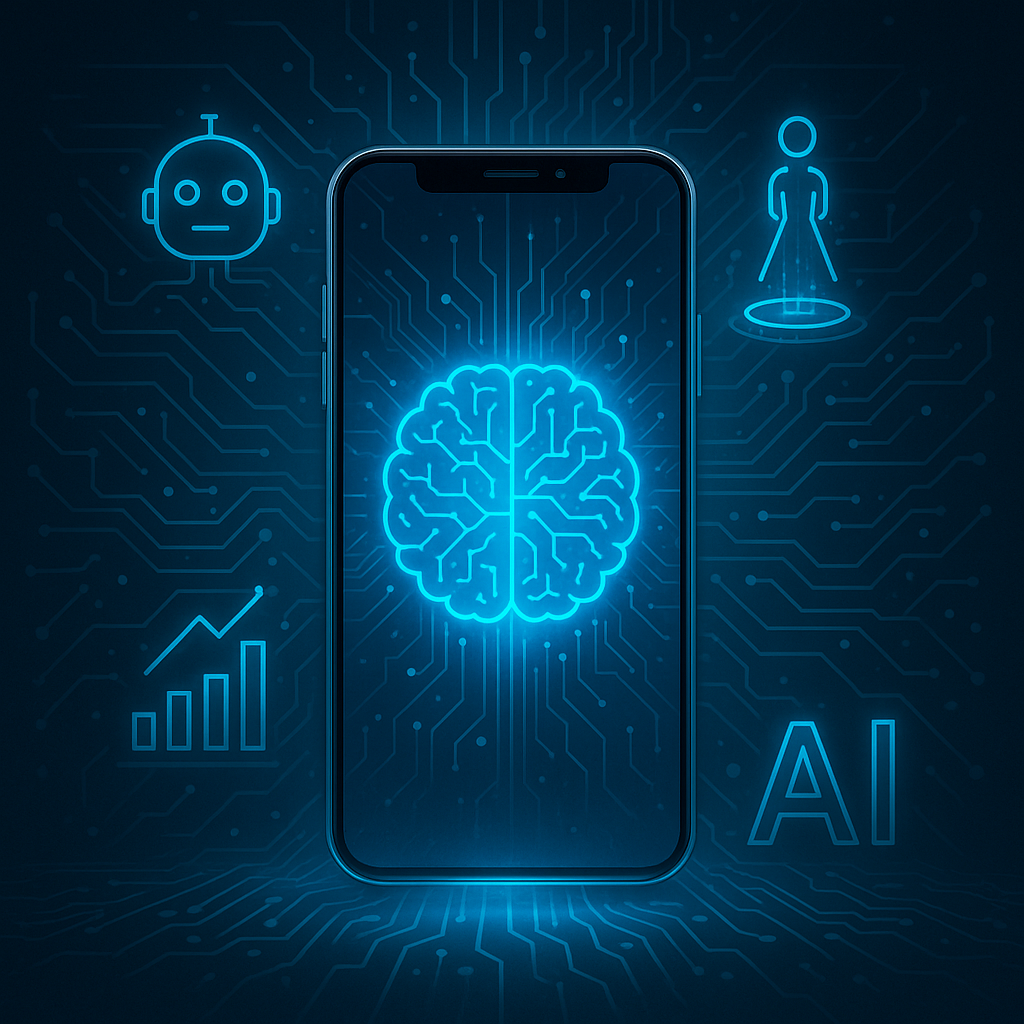
Artificial Intelligence in Your Pocket: How AI Has Arrived on Your Smartphone
Share
Not long ago, Artificial Intelligence (AI) seemed like something reserved for massive data centers, complex algorithms, and sci-fi films. Today, it's in your pocket. The latest tendencies in AI 2025 have brought advanced capabilities to the palm of your hand — embedded in your smartphone, shaping the way we communicate, work, shop, and even monitor our health.
The future of AI is no longer coming — it’s already here. And it's personal, portable, and more powerful than ever.
In this article, we’ll explore how AI is transforming everyday mobile experiences, with real-world applications in marketing, healthcare, and finance. You’ll discover the opportunities and challenges of having artificial intelligence on your smartphone, and why this shift is revolutionizing the way businesses and individuals interact with technology.
Until recently, most AI tasks were processed in the cloud. Now, thanks to advances in chip architecture and edge computing, your smartphone can run AI models locally, without needing constant internet access.
What changed?
-
Modern smartphones like the iPhone 17 or Pixel AI Pro come with dedicated neural processing units (NPUs).
-
These chips are optimized for tasks like image recognition, language processing, and predictive behavior.
-
The result: faster, more private, and more efficient AI on your device.
This move toward on-device intelligence is crucial for speed and privacy. From unlocking your phone with your face to smart photo enhancements, the line between hardware and intelligence is disappearing.
💼 AI Applications in Business and Marketing
AI in smartphones is changing how brands connect with consumers and how marketers collect and analyze data.
Real-world Examples
-
Voice assistants like Siri, Google Assistant, and Alexa are smarter than ever, understanding context, intent, and emotional tone.
-
AI-driven photo editors help creators generate marketing visuals in seconds with tools like Adobe Firefly or Canva Magic Edit.
-
Behavioral prediction models track app usage and browsing patterns to recommend products before users even search.
Benefits for Marketers
-
🔍 Hyper-personalized ads based on real-time user data
-
🧠 Sentiment analysis from social media via AI APIs
-
📈 Automated performance insights from mobile dashboards
AI isn’t just a backend tool anymore — it’s in the hands of every consumer, creating a new intelligence layer between brands and users.
🏥 Health in Real Time: AI and Mobile Wellness
Smartphones have become personal health assistants, thanks to AI.
Use cases in Healthcare
-
AI-powered health apps monitor sleep, heart rate, and oxygen levels using sensors and analyze the data for early warnings.
-
Mental health support tools use natural language processing to detect stress or depression based on typing patterns and tone.
-
Fitness trackers powered by machine learning adjust workouts in real-time based on fatigue, heart zones, and activity levels.
📲 For example, Apple Health now provides proactive suggestions based on AI patterns — like suggesting meditation after periods of stress or alerting when irregular heart rhythms are detected.
💰 Smarter Finances: AI in Your Pocket
AI is revolutionizing how we manage money from our phones.
Practical Financial Examples
-
Budgeting apps like Cleo or JAGE Wallet use AI to categorize expenses, predict future spending, and give real-time alerts.
-
AI fraud detection runs continuously in mobile banking apps to detect suspicious behavior instantly.
-
Investment platforms now provide robo-advice based on your behavior, goals, and even your personality type.
The result: your phone becomes a financial advisor, accountant, and fraud detector — all in one.
⚖️ Benefits and Challenges of AI on Smartphones
✅ Main Benefits
-
Speed: Instant AI processing without internet.
-
Privacy: More data stays on your device.
-
Convenience: AI in your hand, 24/7.
-
Personalization: Your device learns your habits and adapts.
⚠️ Main Challenges
-
Battery consumption increases with heavy AI tasks.
-
Ethical concerns about data collection and manipulation.
-
Bias: AI predictions may reinforce existing stereotypes.
-
Overdependence: Users may rely too much on automated decisions.
Balancing innovation with responsibility is essential as AI becomes embedded in daily mobile life.
🚀 What’s Next for the Future of AI in Smartphones?
Looking ahead, we can expect even more powerful on-device AI experiences, including:
-
Real-time AI translation across any app or voice call
-
AI that adapts to your emotions in messaging and music
-
Full control of smart homes and wearables via mobile AI
With generative models like ChatGPT, Gemini, and Claude running directly on phones, the gap between human and machine intelligence is shrinking — and doing so at lightning speed.
📬 Get Ready for the AI Revolution in Your Pocket
The tendencies in AI 2025 are clear: Artificial Intelligence is no longer a distant concept — it’s in your phone, working for you, learning from you, and adapting to your needs in real time.
Whether you’re a business owner, a marketer, a patient, or just someone who loves tech, the future of AI is personal — and it fits in your hand.
👉 Want to stay ahead of the AI curve?
Subscribe to our newsletter for weekly insights on the latest trends in artificial intelligence, smart devices, and how they’re reshaping every industry.
